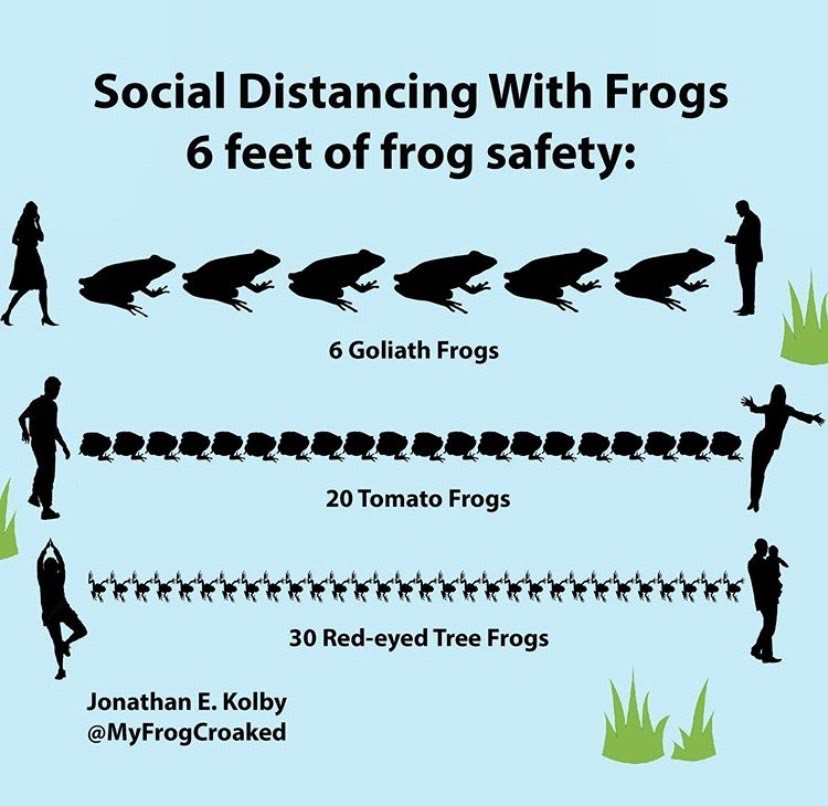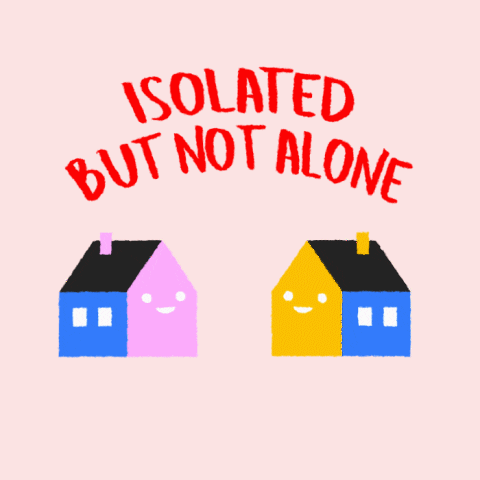
At the time I’m writing this, it’s been about a month and a half since social distancing protocols were put into place. March 17 was the last time I hung out with humans other than my family (who I’m living with), and since then I’ve been hunkered down in my home doing what I can to help our community and reduce the spread of COVID-19 (I stopped counting days about two weeks ago). As many people have documented, it is absolutely essential to follow social distancing protocols to ensure the community spread of COVID-19 is minimized and the strain on our health system is reduced. This means leaving your home as little as possible and maintaining a six-foot distance between you and others if you must leave your house.

For many, this also means ensuring you’re not seeing the people you don’t live with, AKA not visiting with friends and family who aren’t in your immediate living space to prevent spreading the virus. It also means getting uncomfortably used to the people you do live with, since you’ll see them way more than you’re used to. As I mentioned in my post on the political considerations on the political considerations of the COVID-19 pandemic, we don’t yet know the long-term psychological impact of prolonged social isolation. But what about short term concerns of COVID-19’s impact on our relationships? Whether that be our romantic partners, family members, friends, coworkers, or mentors, there are some unique challenges social distancing poses.
Since the pandemic began I’ve been spending time with my family (read: bothering my dog). In a lot of ways, for the first couple weeks of social-distancing I felt the day-to-day activities my life didn’t drastically change. I’m in the last year of my degree, so I already wasn’t on campus often: I had Mondays, Wednesdays, and Fridays off.
But the loss of even small interactions with friends, classmates, coworkers, supervisors — really just other humans — started to compile around the third week of isolation. I spent a lot of time on FaceTime calls, phone calls, and Zoom calls trying to desperately recreate some sense of normalcy. For some relationships, this was great — particularly with my friends and family who don’t live in the city or the country. I was able to reconnect with them during the sudden free time I was given and we had a lot to catch up with on our own ways of managing the global pandemic.

But for others, especially those friends who prefer to catch up in person, it’s taken a toll on maintaining a connection when physical meet-ups have been the way we stayed in touch. This includes relationships with coworkers, classmates, and supervisors. For students, a lot of our friendships are through the social networks on campus. Moving learning and work online meant friendships and relationships also moved online. For some, it meant friendships and relationships were suspended or cut short altogether. That one person in your seminar class you had fun chatting with but had yet to ask for coffee. Coworkers you’re not close enough to FaceTime, but enjoy spending time around. Profs or instructors you wanted to get to know better before the term ended. Since I graduate this year, a lot of my friends have plans for next year already lined up. I’ll be making a move as well, and I’m dreading the possible reality of not being able to say goodbye to the people in my life in person before I leave, or they leave.
I’ve also had friends express the challenges of maintaining a romantic relationship in quarantine, for both those who don’t live together and for those who do. Maintaining connection with your loved ones becomes incredibly difficult whether you’re in the early stages of a relationship with the pace of your relationship accelerating as quickly as the news breaks, or living together when the lack of personal space and time alone puts a strain on your partnership. Also, to the single people whose crushes they’ll likely never see again: my condolences, man.
The good thing is, these measures won’t be in place forever and there are ways we can stay connected and can make the most of our relationships in quarantine times. Freya wrote a really awesome post which details nine creative ways to stay connected with friends during social distancing, and I want to offer a few more ideas:
Communicate the best you can
With everything going on, it can be hard to express the feelings we’re having into words. But it’s really important to be as honest as you feel comfortable doing with your loved ones. Oftentimes I forget that what I’m feeling during this pandemic, like the sadness or the impending sense of doom, isn’t unique. That isn’t to say that we should just shrug and say well, hey, everyone’s in the same boat, I should suck it up. It’s so that we can get perspective on just how connected we all really are, down to intimate feelings of loss and uncertainty that we’re all experiencing and all coping with. Being open about our feelings with our friends and family can help ensure we aren’t letting them fester.
Opt for talking instead of texting
Texting truly doesn’t replicate human connection. I sound like an old person when I say this, but seriously. Unless it’s an animoji of a shark, I don’t want an iMessage.

Set up time to chat over the phone, see if FaceTime is a possibility, or even just have a friend in the background on a video call while you do your work. These simulations of connection can go a long way of resembling some of the connections we’re unable to experience in person.
Respect boundaries
Maintaining the health of our relationships in quarantine also means respecting boundaries. This can be anywhere from respecting when the people you live with need time alone, to respecting the priorities of your friends. Some folks might be more inclined to hang out with their family and have less time for their friends, and others might be the total opposite. It’s important for us to ensure we have appropriate expectations for those around us. Sometimes that text just doesn’t need an immediate response, even if people are home, and that’s okay.

All in all, this quarantine will definitely test our relationships and it can be really stressful to manage everything. But I know that at the end of the day it’ll make us want to be around each other more and have a greater appreciation for the loved ones in our lives. I can imagine exactly what I’m doing as soon as I can see my friends again.